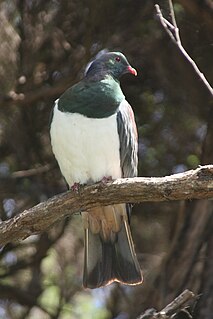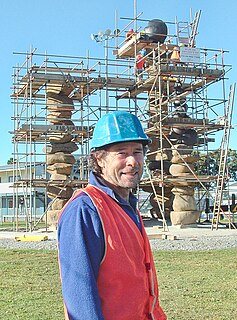Related Research Articles

Wellington is the capital city of New Zealand. It is located at the south-western tip of the North Island, between Cook Strait and the Remutaka Range. Wellington is the major population centre of the southern North Island, and is the administrative centre of the Wellington Region, which also includes the Kapiti Coast and the Wairarapa. It is the world's southernmost capital of a sovereign state. Wellington features a temperate maritime climate, and is the world's windiest city by average wind speed.

The North Island, also officially named Te Ika-a-Māui, is one of the two main islands of New Zealand, separated from the larger but much less populous South Island by the Cook Strait. The island's area is 113,729 square kilometres (43,911 sq mi), making it the world's 14th-largest island. It has a population of 3,896,200, accounting for approximately 77% of the total residents of New Zealand.

The National Provincial Championship (NPC), known for sponsorship reasons as the Bunnings NPC, is a professional rugby union competition for New Zealand provincial unions consisting of 14 teams, divided equally between the Premiership Division and the Championship Division. The NPC remains the second highest level of professional rugby union in New Zealand, after Super Rugby. The NPC's 11-week regular and finals season runs from two weeks after Super Rugby ends to the third week after Labour Day, with each team playing 10 games and having one week playing twice. Following the conclusion of the regular season, four teams from each division advance to their respective play-offs, a single-elimination tournament of semi-finals and final.

The kererū or New Zealand pigeon is the only pigeon endemic to the New Zealand mainland. A large conspicuous pigeon with distinctive noisy wingbeats, it is the only remaining New Zealand bird capable of swallowing large fruit, and so is an important seed disperser for native trees. Kererū were a significant food source for Māori and were the food of choice for Matariki or Puanga celebrations.

Stuff Ltd is a privately held news media company operating in New Zealand. It operates Stuff, the country's largest news website, and owns nine daily newspapers, including New Zealand's second and third-highest circulation daily newspapers, The Dominion Post and The Press, and the highest circulation weekly, Sunday Star-Times. Magazines published include TV Guide, New Zealand's top-selling weekly magazine. Stuff also owns social media network Neighbourly.

The Edge is a youth-oriented New Zealand entertainment brand consisting of a national radio network, a music television channel - The Edge TV, and an entertainment website. The radio network and website are owned and operated by MediaWorks New Zealand while the TV channel is now owned by Discovery, Inc..

The Hits is a Hot adult contemporary music radio network, broadcasting to 26 markets across New Zealand. It was set up by Government broadcaster Radio New Zealand in 1993 by consolidating existing stations into a single brand and has been privately owned since 1996. The Hits has had the broadest broadcast reach of any radio network in the country since 1996, and is now available on 40 full-power FM frequencies and 18 iHeartRadio streams.

Chris Booth is a New Zealand sculptor and practitioner of large-scale land art.

The Waikato Rugby Union (WRU) is the official governing body of rugby union in the Waikato area in the North Island of New Zealand. Headquartered in Hamilton, WRU was founded in 1921.

Rotoroa Island is an island to the east of Waiheke Island in the Hauraki Gulf of New Zealand. It covers 82 hectares. The Salvation Army purchased it for £400 in 1908 from the Ruthe family to expand their alcohol and drug rehabilitation facility at nearby Pakatoa Island. Men were treated at Home Bay at Rotoroa, while women were treated at Pakatoa. This treatment facility was closed in 2005.

Public transport in New Zealand exists in many of the country's urban areas, and takes a number of forms. Bus transport is the main form of public transport. Two major cities, Auckland and Wellington, also have suburban rail systems that have been gaining more patronage and new investment in recent years. Some cities also operate local ferry services. There are no remaining tram systems active anywhere in New Zealand, though trams once had a major role in New Zealand's public transport.

Formerly known as Auckland Festival, Auckland Arts Festival or Te Ahurei Toi o Tāmaki Makaurau is an annual arts and cultural festival held in Auckland, New Zealand. The Festival features works from New Zealand, the Pacific, Asia and beyond, including world premieres of new works and international performing arts events.

Christopher Pell Liddell is a New Zealand-American businessperson who served as Chief Financial Officer of Microsoft, the Vice Chairman of General Motors, Senior Vice President and CFO of International Paper, Director and Chairman of Xero and the White House Deputy Chief of Staff in the Trump Administration.

MediaWorks New Zealand is a New Zealand-based radio, outdoor advertising and interactive media company jointly owned by U.S. company Oaktree Capital Management and out-of-home advertising company QMS. It operates nine national radio brands, twelve websites and one locally operated radio station.

The Pacific Media Network is a New Zealand radio network and pan-Pasifika national broadcasting network, currently owned and operated by the National Pacific Radio Trust and partly funded by the Government. It includes the PMN 531 radio network, PMN News and Auckland-only broadcast station PMN NIU combined are accessible to an estimated 92 percent of the country's Pacific population. The network targets both first-generation Pacific migrants and New Zealand-born people with Pacific heritage. As of 2009, it was the only specifically pan-Pacific broadcaster in New Zealand.

Frances Valintine is an education futurist from New Zealand. She has won numerous awards for her educational programmes and is the Founder and Chair of The Mind Lab and Tech Futures Lab. and Tech Futures Lab. Frances is known for her commitment to working to improve the outcomes for the next generation through contexualising education delivery and content in the 21st Century.
Project NEXT is a proposed public transport payment system for New Zealand. Project NEXT was previously known as the National Ticketing Programme (NTP) from early 2016 to early 2018, preceded by the Auckland Integrated Ticketing Scheme and Auckland Integrated Fares System (AIFS) prior to that. The aim is to achieve a nationally consistent payment system, with a choice of payment by cash, phone, credit card, debit card, or a transit card valid for the whole country. Whilst work at a national level has been undertaken since 2009 and integrated ticketing has been introduced for public transport in Auckland, as of 2020 there is still no national system available. Nine smaller regional councils have meanwhile formed a consortium to introduce a common tag-on-tag-off card branded as "Bee Card" as an interim solution, with rollout of the system from November 2019. Rollout of Project NEXT is expected to start in the Canterbury region in late 2022 and be completely implemented by 2026.
The Mind Lab is a New Zealand Private Training Establishment (PTE) that has degree awarding powers through the New Zealand Qualifications Authority (NZQA), identified as The Mind Lab Limited Partnership. It is based in Auckland.
References
- ↑ Cotton, Jonathan (29 May 2014). "Kermode appointed CEO at Next Foundation". Idealog. Retrieved 27 July 2015.
- ↑ "$100m 'Next Foundation' launched". The New Zealand Herald. NZME. 14 March 2014. Retrieved 27 July 2015.
- ↑ "100 million NEXT Foundation launched". 3 News. MediaWorks TV. 14 March 2014. Retrieved 27 July 2015.
- ↑ Cotton, Jonathan (15 December 2014). "Chris Liddell and NEXT Foundation, his version of Bill Gates' foundation, Kiwi-style". Idealog. Retrieved 27 July 2015.
- ↑ "Chris Liddell resigns from Next Foundation". Stuff. 9 February 2017. Retrieved 13 July 2017.
- ↑ "Dairy industry with NEXT Foundation and DOC join forces to accelerate investment in predator control: Media release 26 February 2015". Doc.govt.nz. 26 February 2015. Retrieved 27 July 2015.
- ↑ "Minister welcomes predator control venture". Archived from the original on 9 July 2015. Retrieved 8 July 2015.
- 1 2 3 http://www.voxy.co.nz/national/next-foundation-announces-first-four-investments/5/210183s/ . Retrieved 14 July 2015.Missing or empty
|title=(help)[ dead link ] - ↑ (DOC), corporatename = New Zealand Department of Conservation. "Project Taranaki Mounga NEXT big project" . Retrieved 13 July 2017.
- ↑ "Taranaki Mounga wins Green Ribbon environmental award". Stuff. 9 June 2017. Retrieved 21 August 2017.
- ↑ "Projects – Predator Free Wellington – Wellington City Council". wellington.govt.nz. Retrieved 13 July 2017.
- ↑ "Wellington to be 'world's first pest-free capital'". NZ Herald. Retrieved 13 July 2017.
- ↑ "Trapping group aims to eliminate Wellington pests". Radio New Zealand. 5 March 2017. Retrieved 13 July 2017.
- ↑ "Predator Free Wellington – the momentum gathers... – Predator Free NZ". Predator Free NZ. 26 September 2016. Retrieved 13 July 2017.
- ↑ "Auckland's Rotoroa Island, reinvented". Stuff. 9 August 2014. Retrieved 13 July 2017.
- ↑ "Project Janszoon gaining ecological footholds in Abel Tasman National Park". Stuff. 31 December 2015. Retrieved 13 July 2017.
- ↑ "Project Janszoon wins international conservation award". Stuff. 19 October 2015. Retrieved 13 July 2017.
- 1 2 "NEXT Foundation Announces Two New Investments in Education | Scoop News". Scoop.co.nz. 2 July 2015. Retrieved 27 July 2015.
- ↑ "Partners aim to boost learning". Rotorua Daily Post. NZME. 3 July 2015. Retrieved 27 July 2015.
- ↑ "Early childhood talk vital to increasing babies' vocabulary". Newshub. 17 November 2016. Retrieved 13 July 2017.
- ↑ "Talking Matters initiative partners up with Marie Clay Research Centre – The University of Auckland". www.education.auckland.ac.nz. Retrieved 13 July 2017.
- ↑ "Fast-track teacher scheme Teach First NZ to be extended". NZ Herald. Retrieved 13 July 2017.